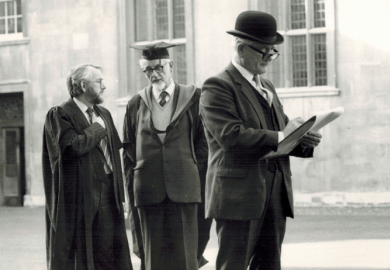The University of Cambridge has been given 10 months to improve standards at its veterinary school or risk losing its accreditation after “wide-ranging concerns” over animal and student welfare were raised.
An inspection by the Royal College of Veterinary Surgeons’ (RCVS) accrediting body earlier this year found that the school had met only 27 of its 77 accreditation standards. While a review had not been due until 2025, “members [had] agreed that an earlier visit was required due to concerns for the students on the programme”.
The subsequent report warns of “ethical concerns” occurring at the school, including evidence animals were being “automatically euthanised”, the use of outdated drugs and discarded drugs being found on stable floors.
It says, further, that “student reports of racism and concerns evidenced [were] not being taken seriously or explored effectively” and in instances where black and Asian students had experienced discrimination while on placements, such “problematic placements [were] not removed from the database despite issues, which may validate discriminatory behaviour in the eyes of other students”.
Due to the “unusually high number of recommendations” and “concerns” over the delivery of the programme from the accreditation panel – which consisted of representatives from veterinary academia, clinical practice and students – the RCVS said it would grant the university “conditional accreditation” for 10 months, with a review of whether to extend its accreditation, due in September 2025.
The university said it was bringing in external expertise to support the department and help lead improvements over the coming months.
An RCVS spokesperson said that “it was unanimously agreed that the number of standards not currently being met, which extended across all domains, meant that the committee made the difficult decision to grant conditional accreditation”.
They added that, given the impact the shortcomings could have on student learning and experience, the committee members “firmly agreed” on the need to “help the vet school support both existing students on and future applicants” to the programme.
“In the meantime, we recognise that both students and staff might have concerns about this outcome, so we remain able and very willing to work closely with the department in the coming weeks to ensure it has appropriate support plans in place.”
Mark Holmes, head of department of veterinary medicine, and Jon Simons, the acting head of the School of Biological Sciences, said the department had been acting on the recommendations since being informed of them in the summer, and “work will now be accelerated”.
“The RCVS noted strong research-led and clinical teaching, which we provide to excellent students, so there is a strong foundation from which to meet these recommendations,” they said.
“While we recognise the RCVS report will cause concern, it is important to be clear that we remain accredited. We will do everything we can reasonably do to support students to complete their courses and receive full accreditation.”
Register to continue
Why register?
- Registration is free and only takes a moment
- Once registered, you can read 3 articles a month
- Sign up for our newsletter
Subscribe
Or subscribe for unlimited access to:
- Unlimited access to news, views, insights & reviews
- Digital editions
- Digital access to THE’s university and college rankings analysis
Already registered or a current subscriber?








